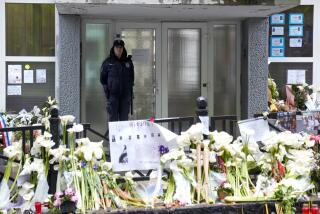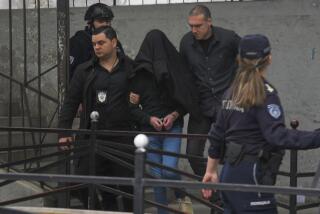Yugoslavs Now Paying for Milosevic’s Fiscal Tricks
- Share via
BELGRADE, Yugoslavia — For most of his time in power, former Yugoslav President Slobodan Milosevic ran a sort of shell game with his country’s economy, shifting resources from one spot to another, always a step ahead of disaster.
Democratic reformers came out on top in Belgrade just as the bill came due. In fact, analysts say that’s why Milosevic called the elections that led to his downfall last autumn: He knew that the country would have trouble making it through the winter and, as a result, his popularity could slide. So he hoped for a fresh mandate from voters before that happened.
As it turned out, most people had already turned against Milosevic, and street protests blocked him from stealing an election he lost. Western aid helped the newly empowered democrats keep the lights and heaters on over the winter, and a recent donors conference in Brussels pledged more money.
But it won’t be easy to turn the economy around before voters become fed up again, raising the risk that they might turn against the pro-Western reformers now in charge.
Such a backlash could bring anti-reform nationalists back to power in Belgrade, the capital of Yugoslavia and its dominant republic, Serbia. That in turn could set back Serbia’s integration into European institutions for years and drive independence-minded Montenegro, Yugoslavia’s other republic, to break away, if it hasn’t already done so.
The $1.28 billion in pledges announced at the Brussels conference last month is only a small first step in tackling the country’s economic problems. Yugoslavia’s foreign debt, for example, is $12 billion, and payments are late on $9.6 billion of that sum, according to the International Monetary Fund.
Meetings with international lenders to discuss restructuring the debt and forgiving much of it will be delayed, officials here say, because Belgrade took longer than hoped to prove its willingness to cooperate with the U.N. war crimes tribunal in The Hague. The June 28 hand-over of Milosevic--who is accused of war crimes against ethnic Albanians in the Serbian province of Kosovo--met that requirement. But by then, a key meeting of governmental lenders had been moved from July to September.
Milosevic left behind an incredible mess in every way: a criminalized economic system, huge foreign debts and a decrepit infrastructure.
Yet he always made sure that most basic necessities stayed unrealistically cheap, and that in small ways, ordinary people could share in the criminality that held sway at the very top of his regime.
It was easy to cheat on taxes, for example, and working in the large gray economy--not quite legal but not exactly illegal--was all right too. Basic utilities were so cheap, they were essentially free, and rents were extremely low.
“This was a great maneuver of Milosevic, to let people not pay for electricity, water, taxes, and to have them wait in queues for ridiculously cheap vegetable oil and bread,” said Aleksandar Nikolic, 35, the owner of a Belgrade bookshop. “All these people had an illusion that their living expenses were very cheap . . . not thinking that the essence of it is they were robbed in a different way.”
Fundamentally, ordinary people paid the price of an increasingly dysfunctional economy. Hyper-inflation stole from them the ability to buy much besides subsidized goods. And various manipulations, including government-influenced pyramid schemes, meant that people lost money they had deposited in banks.
The need to bring prices back to economically rational levels that would pay the true cost of goods and services adds to the political problems reformers now face.
For many ordinary people, life is now worse than ever. Though wages have risen, prices of what had been the most heavily subsidized goods have risen more. The costs of electricity, water, rent, flour, sugar, bread and milk--which in many cases had ranged between 3% and 10% of their real cost--have risen to 60% of their true value or more, and there’s no end in sight.
Meanwhile, new tax laws mark another step toward rationality, but their lack of clarity has introduced confusion.
Nikolic says he wants to run his business completely according to the law, and he wishes that he could expand. But the workings of a new sales tax law remain unfathomable, and conditions aren’t ripe for an improvement in the book business, he says.
“Only when people start to live better can I think of expanding,” Nikolic said. “The way the situation is now, one would always buy for his child a couple of pounds of fruit rather than a book. An enormous number of people think that way. They are living here unable to afford anything else other than maintaining their biological existence.”
The average monthly wage in Serbia is about $65, and unemployment is officially 27%, according to the IMF. But some state enterprise employees aren’t required to show up for work and are paid less than $10 a month. The Yugoslav government places real unemployment at 35%.
Nikolic sees privatization of slow-moving and money-losing state enterprises as one key to a better life. But the pain associated with that process could undermine it, he fears.
“This is a country with big social tensions,” he said. “If privatization is not carefully done, if the tactics of it are not good enough, the whole effort could collapse quickly [because of] social unrest. I’m aware that a lot of people have to be fired. But they have to be protected some way with welfare, in order for that process to be finished.”
The most pressing problem for reformers is that the pledges of aid don’t include enough cash to enable the government to pay pensions and provide other essential social benefits such as health care, said Milan Pajevic, president of G-17 Plus, an independent think tank created by reform-oriented economists.
“Of course it’s not a popular thing for countries to pledge cash,” Pajevic said. “It’s a totally unusual thing. But we badly need some cash for social care and for the most vulnerable part of the society. . . . We are going to ask for more.”
Much of the money pledged in Brussels is tied to specific projects, such as repairing the power and transportation infrastructures, providing farm items such as fertilizer and animal feed, and offering small-business loans. Money is also pledged for customs and border management, legal advice and medical supplies.
All these things are seen as vital to solving basic problems. But if the necessary additional cash help for social benefits doesn’t come soon, reformers are likely to lose power and the international community will face “totally different people” in charge here, Pajevic warned. “I am absolutely sure that many citizens simply cannot stay patient for too long.”
Pajevic speculated that financial help from the West is motivated by its self-interest in Balkan stability, by generosity and by a feeling of moral obligation to help repair the damage caused by 11 weeks of bombing by the North Atlantic Treaty Organization in 1999.
Direct damage in Serbia caused by the NATO bombing--which the alliance said was to halt Milosevic’s brutal crackdown in Kosovo--was calculated by G-17 researchers at $4.1 billion: $300 million in Kosovo, now under U.N. administration, and $3.8 billion in the rest of Serbia. Indirect losses from reduced production were placed at $23 billion.
Thus, many Serbs see Western aid not as generosity but as partial repayment for damage caused.
Pajevic acknowledged that there is legitimate concern that corrupt officials might siphon off aid money.
Under Milosevic, “we were living in total anarchy,” he said. “Intentional chaos was created from above. Corruption was created from above. We were governed by criminals.
“Now there are no criminals on the top anymore. But still the old apparatus is with us. . . . There are thousands of workers in both [the Yugoslav and Serbian] administrations who are still there. Many of them must be changed, and systems, procedures must be changed.”
Without foreign help, reformers will lose the opportunity to change the system, but without changing the system, “money will disappear,” Pajevic said. “It must be treated in parallel. . . . It is not our idea to create an aid-dependent country.”
Winning the confidence of foreign investors--and privatizing most state-owned enterprises--is the long-term key to economic recovery, said Aleksandar Vlahovic, Serbia’s minister of economy and privatization.
One of the first projects will be to sell off 30 large companies that are “deeply in financial difficulties,” Vlahovic said. “We are calling them ‘loss-makers.’ ” These include firms in the steel, auto and electronics industries.
Plans call for 7,500 state enterprises to be privatized in the next four years, he said.
“We’ll try to use privatization as good soil for economic reform,” Vlahovic said. “We need investment. We need the money. Let’s open our ownership structure.”
Dragan Tosic, a 45-year-old social worker, expressed doubt that reforms will move quickly or succeed any time soon.
“The West has been building its political and commercial system and its quality of life for many years,” Tosic said. “It’s practically impossible to catch up in just a few years.”
More to Read
Sign up for Essential California
The most important California stories and recommendations in your inbox every morning.
You may occasionally receive promotional content from the Los Angeles Times.










